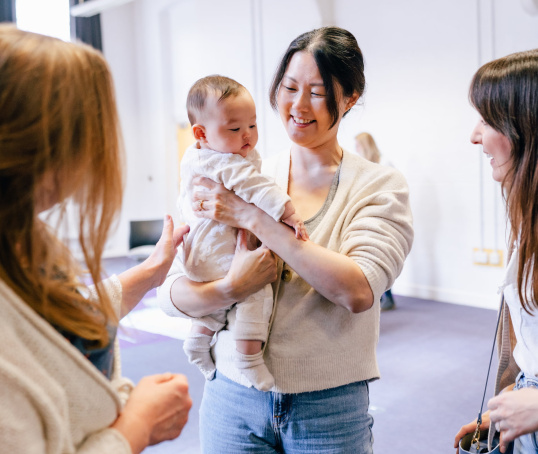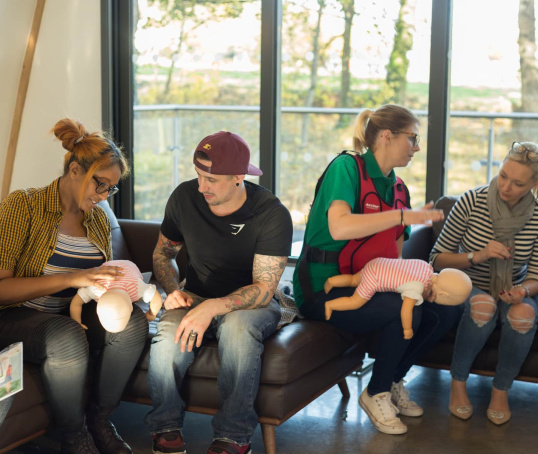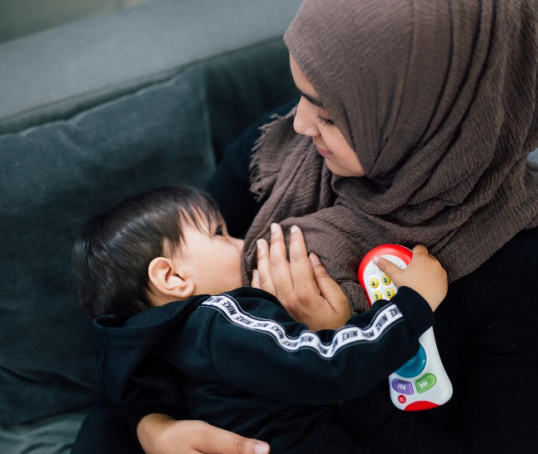The cost of childcare is often a significant issue. Discover here how to get help with childcare costs and your options with a childcare cost calculator.
Check what help you could get with childcare costs
You might be entitled to some free childcare, so it’s worth checking if you qualify to make sure you don’t miss out. Use the childcare calculatorOpens in a new window on GOV.UK to find out how much help you might get.
What free childcare can I get?
How much you can get depends on where you live. You can use these free hours at registered:
-
nurseries and nursery classes
-
playgroups and pre-schools
-
childminders
-
holiday schemes, breakfast and after school clubs.
| If you live in: | Find out if you qualify for free childcare |
|---|---|
|
England |
|
|
Wales |
|
|
Scotland |
|
|
Northern Ireland |
You can use Tax-Free Childcare along with free childcare hours if you're eligible for both. See section on What is Tax-Free Childcare? to find out more.
Find the right childcare option for you with our guide Childcare options
How to get free childcare in England
You might be able to get:
- 15 hours of free childcare for your child is between nine months and two years old
- up to 30 hours free childcare for your child is aged three to four years old.
If you’re working
You can usually get free childcare if you (and your partner, if you have one) are:
-
working or starting a new job
-
on sick leave or annual leave
-
on shared parental leave, maternity leave, paternity leave or adoption leave.
Check if you're eligible for free childcareOpens in a new window on GOV.UK.
If you’re not currently working
All three and four-year-olds can get 15 hours of free childcare but you might still qualify for more if your partner is working, and you are on carer’s leave or if you get any of the following:
-
Incapacity Benefit
-
Severe Disablement Allowance
-
Carer’s Allowance
-
Limited Capability for Work Benefit
-
contribution-based Employment and Support Allowance.
How to apply for free childcare in England
You can apply online by setting up a childcare account and find Ofsted registered providersOpens in a new window on GOV.UK
Some councils have a list of childcare providers that offer the additional hours on their websites, or you can ask your childcare provider directly.
How to get free childcare in Wales
Free childcare for two and three-year-olds from Flying Start
If you live in a Flying Start area, some two and three-year-olds can get free part-time childcare for 2.5 hours a day, five days a week for 39 weeks a year. Find your local Flying Start serviceOpens in a new window
Free childcare for three and four-year-olds
All three and four-year olds can get 10 hours of free early education a week for 48 weeks a year in a school or funded nursery. This is known as the Foundation Phase.
Some three and four-year-olds can get an extra 20 hours of free childcare, making it a total of 30 hours a week for 48 weeks a year.
Who can get the extra 20 hours
-
Both parents must be working, or if you’re a single parent, you need to be working.
-
You must live permanently in Wales
-
Over the next three months, you and your partner (if you have one) must each expect to earn at least the National Minimum Wage or Living Wage for 16 hours a week on average
-
Each parent must earn less than £100,000 a year.
How the hours work
You can’t carry over unused hours to another week. Many childcare providers spread the hours across the year, so you might get an average of 22 hours a week instead of 30. Ask your childcare provider how they manage the hours.
How to apply for free childcare in Wales
You can apply for free childcare through your local Family Information Service. For more details, see Child Care Information WalesOpens in a new window
Some councils have a list of approved childcare providers, You can check if a provider is approved on Care Inspectorate WalesOpens in a new window
How to get free childcare in Scotland
In Scotland, all children aged three to five can get up to:
-
22 hours a week if spread across the whole year
-
30 hours a week if only used during school term time.
Some two-year-olds might also be able to get free early learning and childcare if:
-
you receive certain benefits
-
you or your child have experience of care.
How to apply for free childcare in Scotland
You can apply and find out more about free childcare and education in Scotland on Parent ClubOpens in a new window
How to get free childcare in Northern Ireland
In Northern Ireland, children are entitled to at least 12.5 hours of free pre-school education a week for 38 weeks in the year before they start primary school.
Find out more about free preschool education in Northern Ireland on nidirectOpens in a new window
If you’re receiving Tax-Free Childcare for children not yet in primary school, you might be eligible to get an extra 15% for childcare. Find out more about the Northern Ireland Childcare Subsidy SchemeOpens in a new window
Universal Credit
Universal Credit is a benefit for people in, and out of, work. It replaces six existing benefits.
Working families who qualify for Universal Credit can claim back up to 85% of their monthly childcare costs.
Find out more in our guide Universal Credit explained.
Who gets it?
Usually you and/or your partner will need to:
-
be working (it doesn’t matter how many hours you or your partner work), or
-
have a job offer.
How much is it?
You can get:
-
£1031.88 a month for one child
-
£1768.94 a month for two or more children.
You can only claim if your childcare is provided by a government registered or approved childcare provider. For more details, see GOV.UKOpens in a new window
How to claim your childcare costs
Childcare costs are paid in arrears. This means you’ll usually:
-
pay the childcare costs yourself
-
report the childcare costs through your online account, and
-
be paid back on your next Universal Credit payment.
You have until the end of the second assessment period after the childcare took place to report these costs.
For example, if your assessment date (the day you started your Universal Credit claim and get paid) is the 10th and you want to claim back childcare costs you paid in September, you have until 10th November to report the costs.
You can only claim back childcare costs for the period they were actually provided. So, if you pay for childcare more than a month in advance, like paying for a whole term, you should report the costs as usual. You’ll be paid back in instalments over up to three assessment periods.
What to do if you’re struggling to pay childcare costs up front
If you cannot pay that upfront cost, you might be able to get help with that through the Flexible SupportOpens in a new window
If you've got a job offer, you can ask for help with childcare costs for the month before you start working. Speak to your work coach about your job offer and what support you can get.
You can also get help with childcare costs for at least a month after your job ends to keep your childcare going while you switch between jobs. Find out more on GOV.UKOpens in a new window
Northern Ireland
If you live in Northern Ireland and qualify for the childcare element of Universal Credit and other income-based benefits, you can apply for a non-repayable grant of up to £1,500 from the Adviser Discretion Fund (ADF). You can do this through a work coach at your local Jobs and Benefits centre.
The grant will be paid directly in advance to a registered childcare provider. Any money given for childcare costs will count towards the £1,500 yearly limit for ADF awards.
Find out more about the Adviser Discretion Fund (ADF)Opens in a new window on nidirect.
What is Tax-Free Childcare?
Tax-Free Childcare is a government scheme to help working parents with the cost of childcare in England, Scotland, Wales and Northern Ireland.
It can pay for:
-
registered childminder, nanny, playscheme, nursery or club
-
childminder or nanny with a registered childminder agency or childcare agency
-
registered school
-
home care worker working for a registered home care agency.
Your childcare provider must be signed up to the scheme before you can pay them and benefit from Tax-Free Childcare. Check with your childcare provider to see if they’re signed up.
You can use Tax-Free Childcare alongside free childcare hours, if you’re eligible for both.
But you can’t use Tax-Free Childcare at the same time as:
-
Universal Credit
-
childcare vouchers.
If you’re already getting help with childcare costs through Universal Credit, opening a Tax-Free Childcare account will stop all your benefits payments, not just the childcare part. If you’re unsure whether using Tax-Free Childcare or your benefits would be better for you, speak to an independent benefits adviserOpens in a new window on Advice local
Who can get Tax-Free Childcare?
To qualify, usually, one or both parents need to:
-
be employed and have children under 12 years old (or under 17 if your child has a disability). After the child turns 11, they no longer qualify. Adopted children are eligible, but foster children are not
-
earn at least the National Minimum Wage or Living WageOpens in a new window for an average of 16 hours per week
-
have an adjusted net income of no more than £100,000 per year, per parent. Learn more about adjusted net incomeOpens in a new window on GOV.UK
-
be employed or self-employed. If you or your partner are on maternity, paternity, or adoption leave, you may still qualify. You can also apply if you start or return to work within 31 days.
If you’re caring for someone, you’re ill, or have a disability and can’t work, you can still qualify for a childcare account if one parent is working, and the other is unable to work and receives any of the following benefits:
-
Carer’s Allowance
-
Incapacity Benefit or long-term Incapacity Benefit
-
Severe Disablement Allowance
-
Contribution-based Employment and Support Allowance
-
National insurance credits for incapacity or limited capability for work.
How much is Tax-Free Childcare?
You can get up to £500 every three months (up to £2,000 a year) for each child to help with childcare costs. If your child has a disability, you can get up to £1,000 every three months (up to £4,000 a year).
With Tax- Free Childcare, you’ll set up an online account for your childOpens in a new window and add money to the account to use to pay your childcare provider. For every £8 you pay into this account, the government will add £2.
Other people, like grandparents or family friends, can also contribute to the account.
How to apply for Tax-Free Childcare
You can apply online by setting up a childcare accountOpens in a new window on GOV.UK.
Every three months, you’ll need to check and confirm you still qualify using your online childcare account. You’ll receive a reminder to do this.
Even if your circumstances haven’t changed, simply confirm this. If your situation has changed, the government will recheck if you’re still eligible.
Wraparound childcare in England
Wraparound childcare is before and after school care for primary school children, usually from 8am to 6pm during term time.
It can take place at school or at a nearby locations like a:
-
community centre
-
nursery, or
-
childminder.
This is different from out-of-school activities, or school clubs, which are less regular.
Who can use wraparound childcare?
All parents in England with primary school-aged children can access wraparound childcare.
How to access wraparound childcare
Contact your child’s school or your local Family Information ServiceOpens in a new window to see what’s available in your area.
How to pay for wraparound childcare
Prices vary depending on the provider. You pay the provider directly.
If you qualify, you can use Tax-Free Childcare or Universal Credit to help cover the costs. You might also get help with upfront costs. Check what support you can get using the childcare eligibility checkerOpens in a new window
Free Breakfast Clubs
The government is planning to fund free breakfast clubs in every primary school. The first 750 schools have been confirmed, and more details will be shared soon. For more information, see GOV.UKOpens in a new window
Workplace nurseries
Some companies have their own nurseries, either at your workplace or at another location.
Your employer decides how much you’ll need to pay to use the workplace nursery.
Whether it’s free or at a discounted rate, it’s considered as a tax-free benefit of your job.
Check with your employer to see if they offer a workplace nursery.
National Insurance credits for grandparents caring for grandchildren
If you’re a grandparent or another relative looking after children while their parents are at work, you can get National Insurance credits. These credits can help you build up enough qualifying years for your State Pension.
You need 35 qualifying years to receive the full State Pension.
You can check your National Insurance record on GOV.UKOpens in a new window
These National Insurance credits are called Specified Adult Childcare credits, and you’ll need to apply for them.
To learn more about Specified Adult Childcare credits and how to apply, see GOV.UKOpens in a new window
This article is provided by the MoneyHelper.
This information on this page is provided by Money Helper (previously Money Advice Service) and is updated regularly.
Further information
Our support line offers practical and emotional support in many areas of pregnancy, birth and early parenthood: 0300 330 0700.
You might find attending one of our NCT New Baby groups helpful as they give you the opportunity to explore different approaches to important parenting issues with a qualified group leader and other new parents in your area.
Make friends with other parents-to-be and new parents in your local area for support and friendship by seeing what NCT activities are happening nearby.









